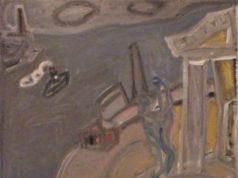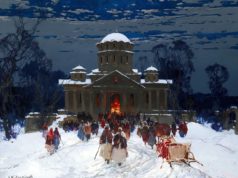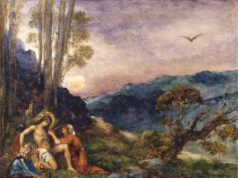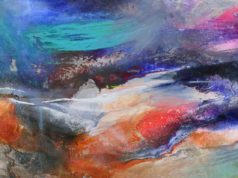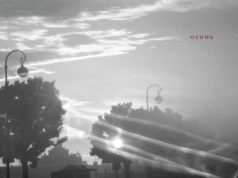Josephine von Zitzewitz (London) — literary critic, translator. Philologist, Researcher at Cambridge University. Sphere of scientific interests: Russian poetry in general, literature and culture of the late Soviet period, unofficial culture, samizdat, the influence of religious views on literature. Since 2003, he was a voluntary assistant to the Memorial Society, a participant in the collection of the Virtual Gulag Museum. In 2009 she defended her Ph.D. thesis in Oxford on the theme: «The Religious Renaissance» and its Repercussions on the Soviet Literary Process in the 1970s, which can be found in the library of the University of Oxford.
Introduction
Oleg Okhapkin’s poetic oeuvre was shaped by his Christian faith from the very beginning. Experiments with religious imagery and lexicon were popular in Leningrad unofficial from the late 1960s onwards. Okhapkin, however, is different from his peers in that he afforded religious significance to his literary work. As he stipulated in the poem ‘Slovo’: ‘Едва ли знал, что в себе таило/ Дарованное мне от Бога Слово И если это – крест, его приемлю.’ [I hardly knew what the Word/God had given me concealed inside itself/ And if this is the cross I accept it].1
The aspiration to create ‘religious’ or ‘Christian’ art is fraught with difficulties. The religious artist has little scope for experimentation; his art must reveal Christian tenets in accordance with Scripture and the teachings of the Church. Ol’ga Sedakova, a poet of Okhapkin’s generation whose work is also often labelled ‘Christian’, was keenly aware of the problems arising from accepting the label ‘religious’: ‘Назвать себя «религиозным» или «православным» поэтом значило бы ручаться за соответствие собственных сочинений доктрине. Поэзия для меня немыслима без открытости смысла.’ [‘To call myself a ‘‘religious’’ or ‘‘orthodox’’ poet would mean to vouch for my work’s correspondence to doctrine. Poetry without an open meaning is unthinkable to me.’] 2 Okhapkin does not seem to have thought along those lines; on the contrary, at least at some point he must have regarded his poetry as a means for spreading the Christian message. In an interview, given in 2004 to Elena Pudovkina, Okhapkin stated: ‘Сейчас, когда открылось столько храмов, где звучит настоящая литургическая поэзия, мои стихи уже не так нужны’. [‘Now that so many churches have been opened in which true liturgical poetry can be heard my poems are no longer that necessary’].3
This essay will examine the following questions: What do the poems look like in which he spread the Christian message, what exactly is their message, and are there any points of conflict between Okhapkin’s work and Christian doctrine?
1. Archetypes: The Poet as Apostle and Prophet
Okhapkin wrote many poems that retell key stories from Scripture. Treating Scripture as a source of poetic inspiration is a practice that the Leningrad unofficial poets inherited from their Silver Age predecessors. However, as a rule the modernists, and the 1970s poets following in their footsteps, did not work with Bible stories in order to articulate a Christian teaching. On the contrary, the stories are mostly used as a point of departure for a personal message.4 For the Leningrad poets, scriptural references were a way of displaying their own awareness of high culture and claiming membership in the classical European tradition.
Amidst his peers’ richly associative poetic landscapes, which only an erudite reader can decipher, Okhapkin’s biblical narratives stand out for their simplicity.5 While poems such as ‘Vkhod Gospoden v Ierusalim’, ‘Ballada o bludnom syne’ and ‘Mariia Magdalina’ are significantly longer than the Bible passages on which they draw, they preserve the main point of the given story. It is true that the poet freely combines elements from different chapters or verses and employs Church Slavonic alongside a contemporary, colloquial lexicon. Moreover, the lyrical hero habitually adds comments and his own conclusions. Yet these conclusions are all implicit in the original text and do not contradict the biblical message. A fine example is ‘Vkhod Gospoden v Ierusalim’. The title refers to Jesus’ entry into Jerusalem on Palm Sunday (Matthew 21:6), which marks the beginning of the passion. In stanza 5 the narrator’s voice, or rather, his inner ear, fuses the enthusiastic ‘Hosanna’ of the Palm Sunday crowd with the ‘Crucify’ demanded by the same crowd a week later:
Люди встречали Его на царство.
Но, спустившись с горы и завидев город,
Он заплакал о нём, зная в сердце зверство
Тех, кто ныне восторжен, а завтра — Ирод,
Не иначе, каркнет пред римлян ражих:
«Кровь Его на нас и на детях наших!»
Крови! крови! осанна! распни! распни!
Иерусалиме! Голгофы огни!.. [1970, pp. 88-89]6
The people were greeting Him as their king./ But, having descended from the hill and seen the city/ He cried over it, knowing in his heart the brutality/ Of those who today are in raptures and tomorrow – Herod/ Will certainly caw before the burly Romans:/ “His blood is on us and on our children!” Blood! blood! hosanna! crucify! crucify!/ Jerusalem! The lights of Golgotha!…
The enthusiastic crowd turned lynch mob is part of the Gospel narrative. The interjection that Jesus knew that those celebrating you today will betray you tomorrow is Okhapkin’s own, as is the poetic representation of crowd psychology – the abovementioned fusion of the cries ‘Hosanna’ and ‘Crucify’.
‘Mariia Magdalina’ describes the events on Easter morning as told in John 20. Mary Magdalene, one of Jesus’s followers who had witnessed the crucifixion, goes to visit his tomb three days and finds it empty. She then encounters the risen Jesus, but she only recognises him once he addresses her. She then tells his incredulous disciples that he is risen. Okhapkin broadly follows the order of events as presented in the Gospel, but gives ample space to an exposition of Mary’s inner world, something that is not subject of the Gospel narrative:
Разлука. Вот что пролегло в пыли.
И оттого недолгий путь казался
Безвременным. Стоял апрел…
Separation. That’s what lay across the dust.
And that’s why the short way seemed
Timeless. It was April…
Most importantly, the poet writes himself into the scene, to the point that he identifies with Mary and/or the other disciples. This gives the narrative the unusual immediacy of a first person account, an impression that is enhanced by the use of colloquial language alongside near-exact Bible quotations:
Не знаю, что увидел он тогда,
Но думаю, что-нибудь да видел
I don’t know what he saw then,/But I think he must have seen something
Most importantly, Okhapkin explicitly equates the experience of Mary Magdalene, in particular her inability to recognise the risen Christ, with the experience of a person newly coming to faith:
Мы все, ученики Его, в тот день
Осилить не могли второй разлуки,
Когда Он к нам вошел
Лишь много позже волею небес
причину
И понял я: Воистину Воскрес.
Но с Магдалиной всем нам предстояло
Боль перенесть уже в который раз [1072, pp. 136-139]
All of us, His disciples, on that day/Could not handle a second separation/When he entered our room / Only much later, with heaven’s help/ did I understand the reason: He is Risen Indeed.// But together with Magdalene we all had/To bear pain yet another time.
These digressions notwithstanding, the poem does not alter rhythm or message of the Gospel story. It portrays the painful separation of death, followed by encounter and recognition and then the first confession of Christian faith: ‘He is risen indeed’. Yet Okhapkin is sensitive enough as a believer to know that in this life, faith remains faith, not ever turning into certainty ‘пока не пробил воскресный час’ [‘until the hour of resurrection strikes’]. In Okhapkin’s poem Mary’s extraordinary experience becomes the blueprint for Christian experience anywhere; thus the poet succeeds in shortening the distance between the Gospel and its contemporary readers.
This technique of ‘shortening the distance’ is employed even more forcefully in the poem ‘Novoe vino’, where the poet identifies with Lazarus, the friend whom Jesus resurrected from the dead (John 11). The lyrical voice undergoes a similar resurrection experience that turns him into a ‘born again’ man: ‘И вот, меня лишь нет в помине./ Зато есть новое вино/ Твоей, о Господи, любови!’ [‘And see, there is no trace of me/ Instead there is the new wine/ of Thy love, oh Lord!’, 1971, p. 114]. New wine is a biblical image, while the idea of the self vanishing to be replaced with God’s love echoes the words of St Paul: ‘it is no longer I who live, but it is Christ who lives in me.’ (Galatians 2:19-21).
Mary Magdalene and Lazarus are archetypes – their experience forms part of the collective unconscious of all Christians. Moreover, Okhapkin’s lyrical hero is himself an archetype: he is the prophet or apostle, the one communicating truth following divine instruction. As an archetype, Okhapkin’s poet-prophet is universal, while the details of his prophetic calling are profoundly personal. Thus Okhapkin’s biblical stories, which follow a canonical text yet add a large amount of personal detail, emotion, insight, and reflection represent the ambivalent nature of the prophet figure, at once universal and individual. They also foreshadow a tension inherent in all institutional religion, namely the tension between institution and individual, between dogma and direct experience. The scriptural canon is based on a large number of individual accounts; it is sufficient to recall the vision of the Apostle Paul, whose letters found entry into the New Testament and had a decisive impact on Christian theology. But can one person’s experience ever be ‘canonical’?
The mystical traditions of all religions, Christianity included, emphasise the centrality of personal experience of God. This is one of the reasons why religious institutions tend to regard mystics with suspicion. Is it possible that Leningrad underground culture offered scope for genuine mystical experience? Was literature an appropriate medium for this experience? And can we call Okhapkin a mystic? I shall return to these questions in the third and fourth part of this essay.
2. The Problem: Worship of the Literary Word?
A number of Okhapkin’s biblical poems invite the conclusion that the biblical topic is ultimately subordinate to the author’s concern with writing. An example is ‘Tiazhelye krylia’. One of several poems based on the story of the Old Testament prophet Job, at first it seems to be a further case of Okhapkin impersonating an archetype – that of the man whose faith in God remains strong in the face of tortuous trials. The reality is more difficult. The story of Job provides Okhapkin with a conceptual framework for recasting his personal circumstances – the social marginality of the underground artist – in religious terms. Existential need, freely chosen, is reinterpreted as a trial visited upon the poet by God, and religious faith is conflated with faith to his literary vocation:
Одно еще оставил – дар,
то самое, с чего я гол,
Да тяжесть крыл, свободы жар,
Молитвы огненный Глагол [1972, p. 160]
One other thing he left behind – a gift/ that’s why I’m naked,/ And the weight of wings, the heat of freedom/ Prayer’s fiery Word’
The most interesting word in this poem is the very last one – ‘Glagol’, here used in its archaic sense of ‘Word’.7 The fact that it is spelled with a capital indicates that the poet is not simply talking about prayer words. Rather, the capital letter invokes Logos, the creative Word of God which created all things and which, according to the Gospel of John, became incarnate in Jesus Christ. At the same time, ‘Tiazhelye krylia’ is a poem about the poet’s calling, and it suggests that a poetic calling can be a sort of religious vocation. Thus the word ‘Glagol’ here carries echoes of both the divine creative Word and the literary word created by the poet.
The kinship between divine and literary word validates the writer’s labour in religious terms. Divine and literary word are more clearly identified in the long poem ‘Ispytanie Iovy’ (1973), yet another text in which the poet likens his own fate to that of Job. It is difficult to distil a clear story line from this poem, which combines elements from different books of the Old and New Testament. Early in the poem the first person narrator experiences a crisis and seeks solace in the book of Job. However, soon we realise that he is not primarily a reader, but a writer himself. He had been writing a poem he was unable to finish (‘И выпало перо/ из рук моих…..’ [‘And the quilt/ fell out of my hands…’], and this poem suddenly acquires a life of its own when the Word itself addresses the poet, sounding inside his own being and also in his creation, the text. This event resembles a religious vision:
И внутрь меня разверзлась дыра.
И в глубине рече Глагол Предвечный:
[…]
Не Аз есмь Альфа и Омега,
Начало и Конец? Дерзай же, дух!
Я сотворил тебя!
And a hole opened up within me./ And in the depth the speech of the Eternal Word: Am I not Alpha and Omega,/ Beginning and End? Dare them, spirit!/ I created you!
The fact that this Word is identified as the ‘Eternal Word’ immediately broadens its significance beyond the literary text. The subsequent near-quotation from the Apocalypse, presented as the utterance of the Word and replete with Church Slavonic, imply that the Word indeed represents Christ. As usual, Okhapkin allowed himself a minor infelicity with regard to the biblical text he is reproducing: in Apocalypse 21:6, the words ‘Я есмь Альфа и Омега, начало и конец’ [‘I am Alpha and Omega, beginning and end’] are pronounced by God the Father sitting on his throne, rather than by Christ, the Word of God.8 The subsequent exhortations, in colloquial language, are already clearly the poets’ own. In the Bible, Christ never assumes the role of creator. Moreover, the ‘spirit’ whom the Word addresses does not feature in the Apocalypse. For those who are tempted to read ‘spirit’ as ‘Holy Spirit’ it must be stressed that according to the teaching of the Church, the Holy Spirit is one of the hypostases of God alongside the Father and the Son, not a creature of either. And anyway, as the poem unfolds it becomes clear that the ‘spirit’ represents the poet himself.
И в образе Олега
Ты – недр Моих исторгнутый издох.
Возьми же сей Глагол и победи Им
Ничтожество твое, ничтоже – дрожь. 9
And in the image of Oleg/ You are the outbreath let out by my bosom./ Take now this Word and conquer with It/ your own pettiness, without a moment’s tremble.
Now the poet writes his own persona into the poem through a complex chain of images: ‘Olega’, the genitive of Oleg, is a convenient rhyme for ‘Omega’. The mention of the ‘Glagol’, Word/Verb refers back to the Word supposedly uttering these lines; at the same time the exhortation to take the word and conquer is a near-quotation from Pushkin’s ‘Prorok’. ‘Prorok’ introduces Old Testament notions, adapting as it does elements from Isaiah 6.
And perhaps these attempts at establishing this poem’s degree of correspondence to Scripture or teasing out literary quotations obscure the main point of Okhapkin’s text. After all, the poet is exhorted not ‘глаголом жечь сердца людей!’ [‘to burn people’s heart with the word’], but ‘победить собственное ничтожество’ [‘to conquer his own pettiness]. In fact, this is not a biblical poem, and the mention of Job fails to summon the image of the archetypical prophet. This is a poem about a writer’s lack of confidence in his own abilities, and Okhapkin equates writers’ block to a crisis of religious faith. What we as readers witness is thus emphatically not an initiation into prophecy, but an exhortation to the poet to overcome his own wretchedness, that is, to sit down and write, and to write well. The next lines confirm my interpretation. They seem to refer directly to the situation of the underground poet, who may face hardship and even death as a consequence of using words (admittedly a hyperbolical formulation): ‘Но берегись! Уж многим повредили/ Слова, от коих смертью да умрешь!’ [‘But be aware! Words have done harm/To many, and they will bring you death!’]. Here, the ‘Word’ irrevocably turns into ‘words’, literary words.
From a doctrinal point of view such an approach is problematic because it amounts to worship of the literary word. In other words, the poet is not utilising the literary word in order to worship God, but rather worshipping the literary word as if the word was his God. This identification of the literary word with Logos we find in the works of Okhapkin’s peers, too. Examples include Viktor Krivulin and Aleksandr Mironov, but they did not have the ambition to write religious poetry.10
3. The Poet and the Mystic: The Silence of Nature
The question of whether Oleg Okhapkin’s oeuvre is centred on literature at the expense of its potential religious message is a difficult one, and perhaps it needs to be answered afresh for each individual poem, or at least for every chronological or thematic body of poems. Let me begin by saying that I believe that ultimately, there is no contradiction between Okhapkin’s faith and his poetics. However, his most profound religious thought is located not in his biblical texts, but in his nature poems.
Okhapkin wrote a large number of beautiful philosophical poems on nature in the best tradition of Tiutchev11, Zabolotskii12 and Pasternak. The nature poems are the site of Okhapkin’s most magnificent Christian visions, such as this landscape that appears to be an iconostasis:
Но из низин всплывает ночь,
И зренью звезд не превозмочь.
Финифтью залит небосвод,
И в нижней бездне с позолот
Небес иконостаса –
Лик непостижный Спаса. [Kakoe schast’ie slushat’ mir, 1969, p. 40]
But night rises from the lowlands/And vision cannot subdue the stars/Enamel floods the vault of the sky/ And in the lower abyss under the gilding/Of heaven’s iconostasis/- The Saviour’s unfathomable face.
In his nature poems the poet no longer assumes the role of a prophet or apostle. Instead he is a wanderer and seeker in the tradition of Romantic nature poetry. Often the nature poems describe a key moment on the spiritual journey, and natural phenomena provide the poet with images for exploring the human being’s inner world. Most of these poems are published in the collection Pylaiushchaia kupina (L: Sovetskii pisatel’, 1990), a very apt title given the fact that Okhapkin considers nature the site of spiritual insight. As a rule, his nature poems appear simple, but this simplicity is deceptive.
The gradual nightfall in ‘S vechera do trekh popolunochi’ reflects an internal process on the level of both form and content. Once the bustle of the day has died down, night can expose the true makeup of things. The poem begins with a fairly ordinary evening scene; the end of each separate observation coincides with the end of a line. But as evening gradually gives way to night, the lines become longer. Enjambment creeps in, and the syntax becomes more complex. Night announces the transition from analysis to silent contemplation and from thought to intuition (‘my thoughts finally came together in silence’).Towards the end of the poem the description of nature is replaced by a meditation on the nature of man. Moreover, the lyrical hero has a religious epiphany; he can literally see the profundity of humanity’s need for God.
Там, в кромешной тишине, глубоко в Боге
Мысли мои сошлись на молчаньем в итоге.
Я увидел вблизи, настолько природа
Величавее нас, как наша порода
Истерична, когда Творец нас покинет
И стихия в тот разрыв поступками ринет.
Все сбылось в час, когда сосны, встав за мною,
Пришли к морю на зов Творца над волною,
Пришли к морю познать Создателя мира,
Мерный времени труд, тебя, моя лира
Древний Духа познать образ в грозном хоре
Раздымавшихся вод, человека в море. [1970, pp. 71-72]
There, in sheer silence, deep in God/My thoughts finally came together in silence. / I saw from close by just how much/ Greater nature is than us, how our nature/ Turns hysterical once the Creator leaves us/ And the element pours into the gap through our deeds. It all happened when the pine trees, standing behind me/Came to the sea called by the Creator above the waves/Came to the sea to know the One who made the world/ The measured labour of time, my lyre/ Is to know the image of the ancient spirit in the threatening chorus/Of the foaming waves, of man in the sea.
We can see that the lyrical hero is a poet. And his religious epiphany is inextricably entwined with his poetic calling, as he now understands how poetry can become, for him as well as for others, a way of knowing God. The substance of the religious vision is the experience of all-unity, of a state of deep harmony with the world around him, an experience that begins ‘inside’ the poet and radiates outwards, expanding until he understand his own path to be identical with that of the world as a whole. The same experience recurs in another long nature poem, ‘Pesnia o poberezh’e’:
Ночь размоет горизонты, небом оденет мир,
Опустит завесу тайны, тьмою размоет явь,
Приблизит к земле просторы звездные, пустит вплавь
Костры побережья, искры вверх понесет в эфир,
Туда, где метеоритов брызги летают, где
Земля — голубая чаша, полная тишины,
Видна далеко, откуда души глядят на нас,
Ангелы где стремятся — каждый своим путем.
Ночь приблизит мне дорогу – Млечный великий Путь,
Освещенный чем-то сверху так, что и тень моя,
Малая там в России, в ненастном сейчас краю,
Ложится крылом огромным на твердь дороги теней. [1970, pp. 69-70]
Night blurs the horizon, clothes the world with heaven/ Drops the curtain of secret, erodes reality with darkness/Brings the starry expanses close to earth, sends the fires/At the riverbanks swimming, makes sparks fly up into the ether,/ To where meteor’s splashes are flying, where/ The earth is a blue chalice full of silence/Visible far away, from the place where souls look at us/Where angels are striving each along his own way.// Night makes my path come near – the great Milky Way,/Lit from above by something so that even my small shadow/here in Russia, in this now inclement region/Covers the hard path the shadows take like a huge wing.
Both poems are exemplary of what Sergei Stratnovskii calls Okhapkin’s ‘cosmic worldview’.13 Nothing marks them as specifically Christian. They do not communicate any elements of Christian teaching. Moreover, they contain an element of pantheism – the idea that God is immanent in the world around us. Yet what they describe is a profoundly religious experience: for one quick, transient moment the human being touches upon that which is infinitely greater than himself and understands that there is an organic bond between himself and this greater being. The memory of this moment of unity will forever fill him with the longing for God, the longing which constitutes the essence of any religious impulse.
In Okhapkin’s vision, the main component of nature’s harmony is a silence that cannot be reduced to the mere absence of words or noise. In Okhapkin’s own words: ‘The earth is a blue chalice full of silence’ (‘Pesnia o porberezhe’). Silence has the function of a door through which the poet enters nature’s innate harmony to partake in it. At the same time, in the silence he experiences an insuperable creative impulse. It follows that silence is an indispensable prerequisite for literary work:
Что неслышно творится во мне
Это все творится в природе
Видишь, сердце светлее вдвойне?
Это солнце любви на восходе
И такая стряслась тишина
В этот творческий миг прорастания
Что душа, как свеча зажжена,
Не мигнет после сна и восстанья. [Pylaiushchaia kupina, p. 16]
The inaudible things that happen inside me/ Are all happening in nature/ You see, the heart is twice as light/ It’s the sun of love that’s rising.// […] And such silence quivered/ In this creative moment of growing/That the soul, alight like a candle/doesn’t blink after sleep and rising.
Moreover, Okhapkin seems to interpret silence as the most profound form of prayer. The identification of silence and prayer is exemplified with particular clarity in the poem ‘Slovo’. Once again the literary word is identified with the divine Logos, indicated by the use of a capital letter:
Едва ли знал, что в себе таило
Дарованное мне от Бога Слово
Когда вначале явлено мне было
Все, что душа любить была готова.
И это было— светозарный образ
Молчания, творимая молитва
И если это – крест, его приемлю.
Но, уносимый к будущего устью,
Я становлюсь несказанною грустью,
И оттого молчанием уже,
И это – жизнь, Глагол моей душе. [1972, pp. 147-148]
I hardly knew what the Word/God had given me concealed inside itself/ When first was revealed to me/ All that my soul was prepared to love.//[…] And this was the bright image/ Of silence, a created prayer. […]/And if this is the cross I accept it./ […]/But carried off to the future’s estuary/I turn into unspeakable sadness/And from there into silence,/And that’s life, the Word of my soul.
Here, Okhapkin introduces his readers to the secret of the divine gift of poetry. The secret is silence, and silence in its purest form is prayer. 14 This is the moment where poetry becomes ‘Christian’ in a doctrinal sense. Silent prayer is one of the cornerstones of Christian mysticism and the ascetic practice of hesychasm, which has a long tradition in the Orthodox church. Its canonical foundation can be found in both the Old and New Testament itself and was developed by the desert fathers, such as John Cassian and Evagrius.15 But Okhapkin also wrote poems such as ‘Golubaia luna’, the only religious reference of which is Buddhist: ‘Чуть печален, как Будда/ Слух Нирване учу’ [‘Slightly sad, like Buddha/I teach Nirvana to my ear’, 1968, p. 30]. Perhaps this is an acknowledgement of the universality of mystical experience. After all, all great religions have a mystical tradition; it is not limited to those practicing Christianity.
4. Talking about Silence?
‘Voploshchenie’ is in a certain sense a ‘programme piece’ entwining literary and religious concerns. Its title invokes the incarnation, and it declares that the poet is guided by the (Holy) Spirit. At the same time it draws heavily on Pushkin’s ‘Prorok’ in the figure of the reluctant poet-prophet who received his inspiration from a six-winged seraph:
Не музой и не демоном храним
Я принял в дар провидческое око,
Покров мой – шестикрылый серафим –
Ужасный гений древнего пророка
И оттого так лёгок мой ярем.
Я верую, что Дух владеет мною.
Preserved by neither muse nor demon/ I accepted the gift of the prophetic eye,/ My cover is the six-winged seraph/ The ancient prophet’s terrible genius./ And this is why my pulse is light./ I believe that the Spirit is guiding me
This reference to Pushkin ties Okhapkin’s prophet to the classical tradition of Russian poetry.16 But ultimately, the emphasis on the religious dimension of his prophecy is Okhapkin’s own. The reference to Isiah 6 notwithstanding, Pushkin did not explicitly present his poet as a religious prophet; his emphasis was on the self-sacrifice required by genius. Okhapkin, on the other hand, manipulated his reference to poetic tradition in order to strengthen his own stance equating poetry and religious prophecy. Moreover, Pushkin does not mention silence, whereas for Okhapkin it is absolutely central. The prophet speaks because his words are the only ‘cover’ for the soul:
Тогда слова – единственный покров.
Прозрачные, они полны смиренья.
И если бы душа не знала слов,
Нагая суть не выдержала б зренья.
Спалила бы сама себя тотчас –
Сгорела б со стыда в грехопадении.
Но стих скрывает чудо, расточаясь
Молчанием в словесном совпадении.
Then words are the only cover./ They are transparent and humble./And if the soul had no words/ the naked essence would not withstand the gaze.// It would burn itself at once -/ would burn out of shame for the Fall./But the poem hides the miracle/ Dissipating as silence in verbal coincidence.
There is a clear hierarchy here in which words are inferior to silence and poetry occupies a place in the middle, as it can touch upon silence and ‘introduce’ silence into words.
Мгновение, и тайна во плоти.
Душа вошла в обыденное слово.
И то, что у неё был на пути –
Я словом был, но вот молчу я снова.
One instant, and the secret’s taken flesh./ The soul’s entered the ordinary word./ And that which she saw on the way -/I was the word, but now I’m silent once again.
The poet brings the ‘secret’ out into the world, enables it to take flesh. But once this task is achieved the poet/prophet sinks back into silence, the word ‘again’ indicating that silence was the original state and poetry merely an interruption. One problem besets any discourse about silence: in order to talk about silence one must use words. Okhapkin was aware of the apparent paradox of language art appealing to silence. In other poems he finds arresting images, e.g. the howling blizzard that exhausts itself and gives way to silence in ‘Peremena’, thus rendering silence not only audible, but visible, too.17
Perhaps the best verbalisation of this predicament is ‘Legko mne gospodi molchat’’ an early poem bristling with religious and literary references and summarising Okhapkin’s key themes:
О, если б грешный мой язык
Из подъязычной тишины
Извлёк бы истину на миг,
То в ней звучал бы стон струны.
Лишь эта музыка права.
Она молчанию сродни [1968, p. 29]
Oh, if only my sinful tongue/ could elicit a moment of truth/ from the silence underneath the tongue/it would carry the string’s moan.// This music alone is true./It is akin to silence
The ‘sinful tongue’ is yet another image borrowed from Pushkin’s ‘Prorok’. The idea of silence as a primeval state from which poetry arises points to the concept Osip Mandelshtam developed in ‘Silentium’ (1910). Mandelshtam’s ‘Silentium’ is in dialogue with Tiutchev’s eponymous poem from 1830, in which the latter stipulates his famous maxime that ‘мысль изреченная есть ложь’ [‘a thought once uttered is a lie’]. Okhapkin’s desire for his tongue ‘to elicit a moment of truth’ appears to rephrase precisely this line.
Words cannot capture truth or, to put it differently, silence loses its truth value once it is verbalised. But poetry, as a language art that asks questions about the nature of language, including its relation to silence, can address silence only through the medium of words. In this respect the poet and the mystic share the same predicament: the mystic’s experience can never be shared, only described, and the mystic who turns to words needs to find images, allegory and the ‘openness of meaning’ that Ol’ga Sedakova mentioned. How can this necessary openness be reconciled with the desire to write ‘Christian’ poetry? If we are prepared to accept a link between Okhapkin’s poetry and the mystical tradition – if we are prepared to read Okhapkin as a mystic – then we must concede that mystic is not concerned with doctrinal accuracy and proselytism; the only thing they can do is perhaps encourage others to seek their own experience. In this sense Okhapkin’s silence poems fulfil a clear religious mission – they point towards the universal experience of harmony and longing for God that mystical experience can yield.
Selected bibliography:
1.«Poetry and the Leningrad Religious-Philosophical Seminar 1974-1980: Music for a Deaf Age» [Поэзия и Религиозно-философский семинар в Ленинграде 1974-1980: Музыка глухого времени]. Oxford: Legenda, forthcoming in November 2015.
2.«Olga Sedakova’s Journey Poems: The Spirituality of Form and the Journey into Silence» [Тема путешествия в поэзии Ольги Седаковой: духовность формы и путешествие в тишину]. Literature and Theology vol 29:2, 2015, pp. 183-198
3.«Поззия как молитва: Елена Шварц и Олег Охапкин». Вторая культура: неофициальная поэзия Ленинграда в 1970-e-1980-e годы. Редактор Жан-Филипп Жаккар. СПБ: Росток, 2013, pp. 346-367.
4.«Viktor Krivulin and Aleksandr Mironov: The Quest for Sacred Language in 1970s Russian Poetry» [Виктор Кривулин и Александр Миронов: в поиске сакрального языке в русской поэзии 1970-з годов], Modern Languages Review 107 (2012), pp. 872-893.
On the splash screen: Natalia Zhilina. Revelers. 1990.
© Josephine von Zitzewitz
© «Okhapkin readings» almanaс №1, 2015
© «Russian culture», 2018



